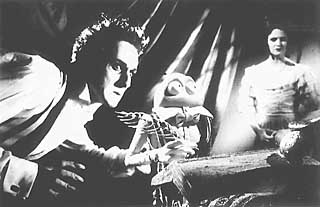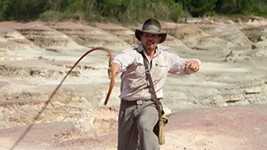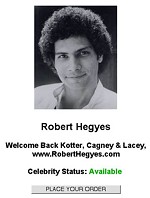Small Screen, Big Ideas
The Territory Begins a New Season
By Sarah Hepola, Fri., Oct. 8, 1999

The Thinking Man's television: Now there's a concept that just never really took off. Between the glut of sitcoms, taut courtroom dramas, celebrity profiles, and news magazines, it's tough to find quality programming on the boob tube, especially without shelling out big bucks for premium cable. Well, at least it used to be. For a half-hour every Sunday from October 10 through January 16, statewide, the PBS series The Territory promises to offer television shows that are provocative, meaningful, and Now embarking on its 24th season, this co-production of the Austin Museum of Art, the Southwest Alternate Media Project (SWAMP), and KUHT-TV (Houston) showcases some of the best independent film and video shorts from around the world. Featured are documentaries, short narratives, animated, and experimental works. A total of 28, to be exact, broadcast during the 12-episode show. The 1999 season of The Territory will also highlight some of the best work discovered at five major Texas film and video festivals: the SXSW Film Festival, Austin Film Festival, Dallas Video Festival, USA Film Festival (Dallas), and the Houston Film Commission's Young Filmmakers' Showcase.
Each program is a half-hour long and airs every Sunday night in Austin on KLRU-TV (channel 18/ cable 9) at 10pm (barring any last-minute programming changes). For more information, check their Web site, http://www.swamp.org. Crosswalk (Lance Larson/Jim Shelton, Austin, 26min, 1998)
This Texas tale of twisted fate serves up a lesson in both cruel and comedic irony when people choose to do the wrong thing for the right reasons. Two experimental narratives from Canada show how the best-laid plans of lovers and petty crooks can easily go awry.
The Bloody Olive (Vincent Bal, Dutch/French Canadian, 9min, 1998)
With a humorous nod to film noir, this cunning black-and-white parody charts a course of duplicity and double-dealing that even the perpetrators themselves can't follow.
Cold Feet (Jim Allodi, Canada, 18min, 1998)
As these twentysomethings search for the quick con and easy cash, they stumble upon one of life's deeper truths. Two offbeat films from New Zealand blend comedy and horror while digging into the darker side of the human condition.
Larger Than Life (Ellory Elkayem, New Zealand, 13 min, 1998)
What is it? Where did it come from? Why does it want to get me? These are just some of the questions asked by our heroine in this domestic drama, but her main question is: How do I get rid of it?
Willy Nilly (Mike Smith, New Zealand, 12 min, 1998)
Two brothers, clearly the models for dumb and dumber, find that the opportunity to get a little life experience leads them, inevitably, back to the future. The Brook (Etienne Robert de Massy, Canada, 27 min, 1998)
We search for the early influences and environment that shaped a musical genius in this exquisite documentary featuring some of Bach's singular compositions. This program features three award-winning student films from the University of Texas at Austin.
Twenty-Five Cents (Tasca Shadix, Austin, 8 min, 1998)
This is a wistful account of the various misadventures of three boys on their way to the store one hot summer day in rural, Depression-era Texas.
Reflections on a Windowpane (Mark Daley, Austin, 6 min, 1998)
Dream and memory converge as an aging man revisits the comfort zones of childhood.
Epitaph (Monica Hoenig, Austin, 9 min, 1998)
Anger gives way to insight as a young woman confronts the painful memory of her long-lost father. Two grown-up children struggle to come to terms with the legacy of an abusive parent.
My Turn (Susan Weisshaar, California, 12 min, 1998)
A young woman haunted by her mother's violent outbursts is the subject of this evocative film diary.
Paper Birds (Chesley Chen, Los Angeles, 17 min, 1998)
Origami and a slow descent into madness are a young man's only defense against "the sins of the father." A variety of animation styles and techniques -- and a variety of animals -- chart the nature and limits of the human imagination in these five pieces.
Little Dark Poet (Mike Booth, England, 5 min, 1998)
The creation of human drama is a capricious and obsessive exercise for this most imaginative amphibian.
Token City (Muriel Magenta and Michael Udow, Arizona, 4 min, 1997)
In many parts of the world humans spend an inordinate amount of time riding subways, but not as cool as this one.
Roost (Amy Kravitz, Rhode Island, 4 min, 1998)
Flickering images and an elaborate soundtrack take on increasingly ominous overtones.
Keep in a Dry Place and Away From Children (Martin Davies and Andy Brown, England, 9 min, 1997)
Chained to his playpen, wings confiscated at birth, a duck-like creature strives to become a swan in his bizarre little world.
Tightrope (Daniel Robichaud, California, 5 min, 1998)
When whimsey and ingenuity fail to achieve good will, the universe sometimes seems to set matters straight on its own.
Four aggressively experimental works whose intricate sound design is as important to their impact as their evocative imagery.
New York Symphony (Reynold Reynolds, New York, 10 min, 1995)
This documentary invokes the city symphony films of the silent era, only here the sounds of the city provide the driving force.
An Autumn Wind (Iara Lee, New York, 6 min, 1993)
Ginsberg's haiku and lush visuals merge to create a poetic Japanese reverie.
Summer, Or Grief (Mary Lucier, New York, 7 min, 1998)
Written text, visual detail, and close-up sound produce a richly textured piece.
L'Arrivée/The Arrival (Peter Tscherkassky, San Francisco, 3 min, 1998)
Found footage and an old-fashioned optical printer are used to recast a familiar movie motif.
Two highly personal experimental narratives trace the anxiety and exhilaration of young womanhood.
Cage of Bone (Stephanie Henault, Canada, 7 min, 1997)
Achingly contemporary, this piece explores the world of an ignored, introspective teenager.
Without Bruce (Siobhan Walshe, Austin, 18 min, 1998)
An aimless dreamer can't shake the memory of a relationship with an eccentric older man.
These nonfiction glimpses of contemporary American life -- one very traditional and the other remarkably innovative -- provide two very different takes on the postmodern human condition.
Catholic School (Jona Frank, San Francisco, 13 min, 1997)
This is an affectionate glimpse of children in the throes of rapturous religious formation.
RoadHead (Tommy Pallotta and Bob Sabiston, Austin, 14 min, 1998)
On the road again, Austin animators give talking heads and roadside stops a creative twist.
Documation
A segment from Jon Pierson's cable show Split Screen includes interviews with Bob Sabiston and cinematographer Tommy Pallotta of Flat Black Films. Three by Three (Jan. 9) Three unusual pieces trace the complex interplay of the personal and the mythical.
Superstition (Leopoldo Gout and Everardo Gout, Mexico/New York, 9 min, 1998)
Music, myth, and millennial angst are blended in this experimental film.
Wieder Holung/Repitition (Nana Swiczinsky, Austria, 8 min, 1997)
Dreams and reality collide in this dark animated tale of a woman confronting her own demons.
Lars 1-10 (Sophie Fiennes, England, and Shari Roman, Los Angeles, 9 min, 1998)
This documentary enables Danish filmmaker Lars von Trier (Breaking the Waves) to explain the origin of Dogma '95, his provocative filmmaking manifesto, which forbids props, sets, genre films, and directorial credit. These rules were employed in his film The Idiots in 1998. 24 Girls (Eva Ilona Brzeski, New York, 29 min, 1998)
Set on the borderland between childhood and adolescence, between dream and reality, this piece juxtaposes the life-affirming performances of pre-adolescent girls with the memory of one whose early death freezes her at this threshold.
Texas Filmmakers' Showcase (Oct. 10)
Northern Pursuits (Oct. 17)
Up From Down Under (Oct. 24)
Seeking Bach (Oct. 31)
CinemaTexas 1998 (Nov. 7)
Regeneration (Nov. 21)
Animated Dreams (Nov. 28)
Sound and Image (Dec. 19)
Women on the Verge (Dec. 26)
Documentary Portraits (Jan. 2)
On the Brink (Jan. 16)










